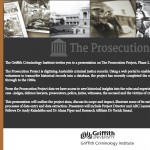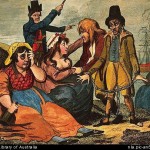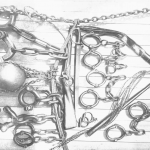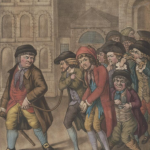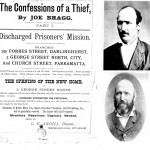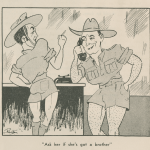Please join us on 5 September 2016.
Celebrating 100,000 records
Recently the Prosecution Project celebrated its completion of 100,000 records. We have marked the occasion with a presentation by the project team of some of the research being carried out with these records. On Thursday 14 July we presented at the Banco Court of the Queensland Supreme Court, an event chaired by the Chief Justice, Her […]
Interloping at a history conference The Digital Panopticon: Penal history in a digital age
Research Brief 24 As the Prosecution Project’s resident statistician, I recently infiltrated my first history conference – the Digital Panopticon held at the University of Tasmania. I must admit that this conference was one of the most fascinating I have attended. Interesting not only for the variety of projects we heard about, but for […]
Contempt of court or contempt for the court?
Research Brief 23 In 2016 the domestic violence epidemic shows no signs of slowing down. It seems Australian men are going mad. Women – and children – are dying as a result. The ever-increasing tally of deaths and serious injuries is prompting many to demand that the legal system needs to do more to […]
Sexual abuse in schools: An Australian history of criminalisation
Research Brief 22 In 1947 a leading psychiatrist, Dr John McGeorge, told the New South Wales Department of Justice that men who abused children were ‘the most dangerous sex offenders’. These men, he went on to assert, were ‘often in a position of trust, [such as] a schoolteacher or scoutmaster’ (State Records NSW, Report […]
Whipping as a criminal punishment
Research Brief 21 For decades, if not longer, well-meaning parents (and perhaps less well-meaning authority figures in institutional settings) utilised the cane or the belt as an instrument of punishment. These methods are increasingly frowned upon. Corporal punishment has been criminalised in some countries for more than thirty years, and in recent years, Australian courts […]
Crime across time: Mapping longitudinal changes in criminal justice
Research Brief 20 One of the benefits of the Prosecution Project’s large-scale digitisation of court records is that it not only allows researchers to trace individuals, but to map changes in the criminal justice process over a long period of time. Mapping these longitudinal changes is not only of potential value to scholars of legal […]
Joe Bragg: a life in crime
Research Brief 19 Last week a new entry appeared in the Prosecution Project database. Trial #64652 records the conviction on 16 February 1870 of Joseph Bragg on the charge of wounding with intent to do grievous bodily harm. He had pleaded guilty. Bragg was tried before the Chief Justice of New South Wales, Sir […]
Reading against the grain: Queer lives and loves in court
Research Brief 18 Court records document more than policing patterns and criminalised behaviours of the past. While they are crucial to writing criminal justice histories, they can be used in other ways, read against the grain to provide a window into particular cultural practices and social behaviours. These narratives are not without their methodological […]
Alcohol abuse and criminal offending
Research Brief 17 Alcohol addiction can be a criminogenic risk factor. Contemporary criminology studies show that drug and alcohol abuse is linked to increased contact with the criminal justice system. A Queensland Corrections policy document cites studies indicating that 29% of offenders reported being under the influence of drugs and/or alcohol at the time […]

